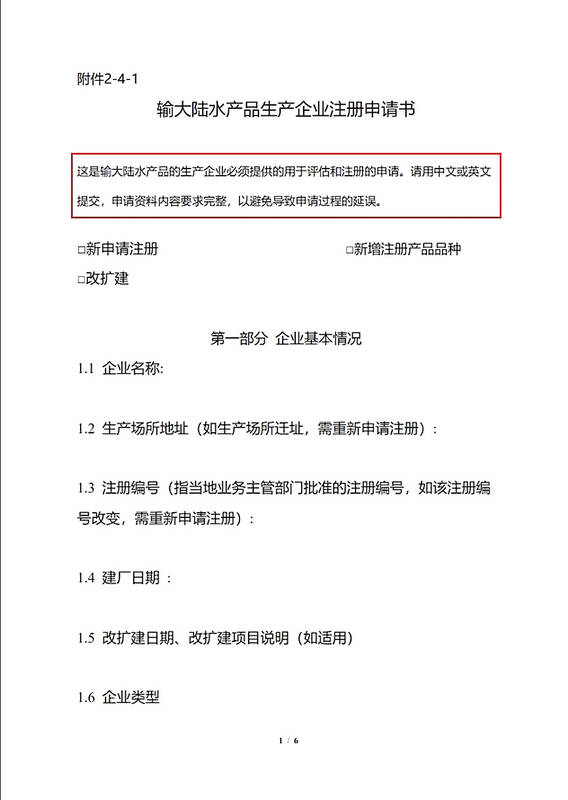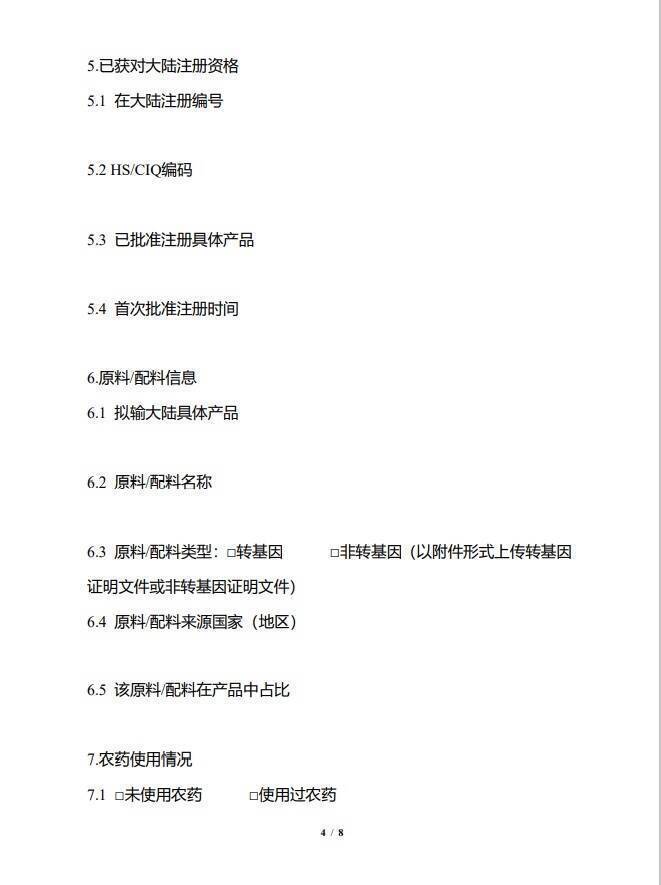The Food and Drug Administration (FDA) yesterday released 31 registration forms and inventory lists Beijing requires Taiwanese exporters to fill out before they can send their products to China, showing that some of them have to disclose the proportions of ingredients used in their products, as well as the cooking time and temperature.
China last week unilaterally suspended imports of many Taiwanese products, including seafood, alcohol and other beverages, affecting 2,409 companies.
The Chinese General Administration of Customs said the companies had submitted incomplete registration information.

Photo copied by Yang Yuan-ting, Taipei Times
Over the past few days, Chinese-language media have reported that several Taiwanese companies are not planning to submit additional documents to resume exports to China, and would instead seek to sell their products in other countries, as the Chinese forms require them to reveal trade secrets.
Among the banned food companies, a Taipei-based producer of pineapple cakes was reported as having given up on submitting additional data required by China. The report cited the company’s owner as saying that she did not want to reveal the proportions of ingredients used, the layout of her factory and other information.
However, the Chinese Nationalist Party (KMT) caucus and some Chinese-language media have criticized the Council of Agriculture and the FDA, saying they had failed to help the companies complete the registrations and questioning whether the information required in the forms really amount to trade secrets.

Photo copied by Yang Yuan-ting, Taipei Times
FDA Director-General Wu Shou-mei (吳秀梅) on Tuesday evening said it is reasonable for a customs agency to ask importers to disclose the ingredients of food products, but the Chinese government goes beyond what is reasonable.
She said Beijing informed the FDA on March 9 that it would require firms to fill out the new registration forms, with the information required depending on what type of products they seek to import.
The FDA respects the companies’ decisions on whether they want to disclose the required information, she said, adding that the decisions involve commercial considerations.
The forms require certain food companies to disclose the proportions of ingredients, as well as processing methods, factory layout and workshop floor plans, as well as other information, the FDA said.
Beijing unilaterally decided to ask companies to use the new forms, requiring them to disclose information “in written form,” which means on paper, the FDA said.
Beijing uploaded the forms to its online food export integration platform on March 18, it added.
Minister of Health and Welfare Hsueh Jui-yuan (薛瑞元) said companies based in other countries can submit the information online.
For them, the “ingredient proportion” field is optional, while the paper forms that Taiwanese firms must use does not mark any fields as optional, Hsueh said.
The FDA said that regardless of whether a Taiwanese producer independently seeks to export goods to China or another company is involved, the forms are the same.
The Chinese customs agency helps companies complete the forms, it added.
As of yesterday, 31 products under “recommended registration” and 824 products under “self-registration” had been approved by Beijing, the FDA said.
Additional reporting by CNA

INVESTIGATION: The case is the latest instance of a DPP figure being implicated in an espionage network accused of allegedly leaking information to Chinese intelligence Democratic Progressive Party (DPP) member Ho Jen-chieh (何仁傑) was detained and held incommunicado yesterday on suspicion of spying for China during his tenure as assistant to then-minister of foreign affairs Joseph Wu (吳釗燮). The Taipei District Prosecutors’ Office said Ho was implicated during its investigation into alleged spying activities by former Presidential Office consultant Wu Shang-yu (吳尚雨). Prosecutors said there is reason to believe Ho breached the National Security Act (國家安全法) by leaking classified Ministry of Foreign Affairs information to Chinese intelligence. Following interrogation, prosecutors petitioned the Taipei District Court to detain Ho, citing concerns over potential collusion or tampering of evidence. The

NEGOTIATIONS: Taiwan has good relations with Washington and the outlook for the negotiations looks promising, Minister of Economic Affairs J.W. Kuo said Taiwan’s GDP growth this year is expected to decrease by 0.43 to 1.61 percentage points due to the effects of US tariffs, National Development Council (NDC) Minister Paul Liu (劉鏡清) said at a meeting of the legislature’s Economics Committee in Taipei yesterday, citing a preliminary estimate by a private research institution. Taiwan’s economy would be significantly affected by the 32 percent “reciprocal” tariffs slapped by the US, which took effect yesterday, Liu said, adding that GDP growth could fall below 3 percent and potentially even dip below 2 percent to 1.53 percent this year. The council has commissioned another institution

NEGOTIATIONS: The US response to the countermeasures and plans Taiwan presented has been positive, including boosting procurement and investment, the president said Taiwan is included in the first group for trade negotiations with the US, President William Lai (賴清德) said yesterday, as he seeks to shield Taiwanese exporters from a 32 percent tariff. In Washington, US Trade Representative Jamieson Greer said in an interview on Fox News on Thursday that he would speak to his Taiwanese and Israeli counterparts yesterday about tariffs after holding a long discussion with the Vietnamese earlier. US President Donald Trump on Wednesday postponed punishing levies on multiple trade partners, including Taiwan, for three months after trillions of US dollars were wiped off global markets. He has maintained a 10 percent

TRADE: The premier pledged safeguards on ‘Made in Taiwan’ labeling, anti-dumping measures and stricter export controls to strengthen its position in trade talks Products labeled “made in Taiwan” must be genuinely made in Taiwan, Premier Cho Jung-tai (卓榮泰) said yesterday, vowing to enforce strict safeguards against “origin laundering” and initiate anti-dumping investigations to prevent China dumping its products in Taiwan. Cho made the remarks in a discussion session with representatives from industries in Kaohsiung. In response to the US government’s recent announcement of “reciprocal” tariffs on its trading partners, President William Lai (賴清德) and Cho last week began a series of consultations with industry leaders nationwide to gather feedback and address concerns. Taiwanese and US officials held a videoconference on Friday evening to discuss the